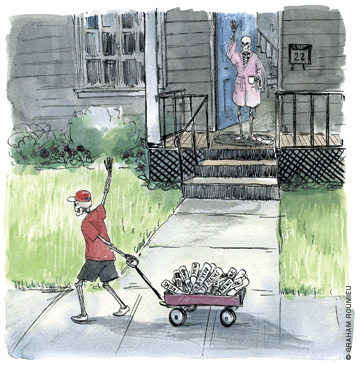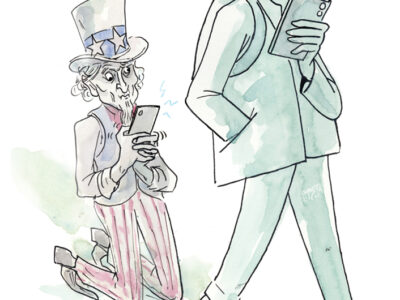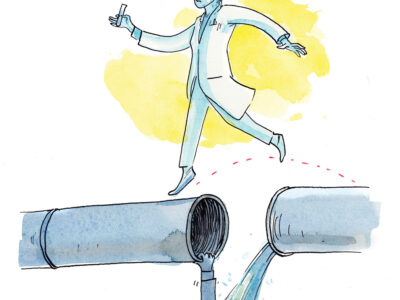
It’s a great time to die—or, at least, to read about it.
By Marilyn Johnson
People have been slipping out of this world in occupational clusters, I’ve noticed, for years. Four journalists passed their deadline one day, and their obits filled a whole corner of the paper. What news sent them over the edge? How often do you see two great old actresses take their bows, or two major-league pitchers strike out together? Often enough to spook.
It is more than coincidence, and certainly more than the alertness of an editor on the graveyard shift. It’s supernatural. I thrilled recently to a pair of obituaries for Paul Winchell, the voice of Tigger in Pooh, and John Fiedler, the voice of Piglet in Pooh; the two had gone silent a day apart. I keep them next to my clip from October 25, 1986, the day The New York Times ran side-by-side obituaries for the scientist who isolated vitamin C and the scientist who isolated vitamin K.
Such coincidences don’t occur every day, but it wouldn’t take you a week to begin a creative collection. A veteran UPI photographer and a veteran AP photographer. The service industry of Hollywood—a hairdresser, a caterer, and a costume designer. Princess Diana and Mother Teresa!
Each day, after I read, I wash the newsprint off my hands and think about universal harmonies. I think about things I haven’t thought about since childhood, such as guardian angels. I used to believe we each walked around with a sort of ghost of our self watching over us. Is it possible that instead of a guardian angel we each have a double, a guarantee that our work gets done? If we’re the sort who isolates alphabet vitamins, there are two of us, just in case. If we are the voice of Tigger, the voice of Piglet backs us up.
A friend of mine used to collect “bus plunge” headlines. Buses plunge over cliffs and into canyons across the world, and newspaper editors seem resigned to the sameness and predictability of such a universal death. Nearly every headline reads, SO MANY KILLED IN SUCH AND SUCH COUNTRY’S BUS PLUNGE. I think of bus plunges as the generic passing. Many of us took the plunge yesterday. What did we have in common? We happened to be riding the same bus. Perhaps the bus is literal—ten of us over a precipice in a south Brazilian state. Or perhaps it is metaphoric—an imaginary bus that on Saturday encapsulates two vitamin scientists and on Sunday bears a cargo of handmaidens to Hollywood.
The bus is an attempt to grasp the unthinkable, of course: one day we’re riding along the highway; the next, we plunge out of sight. Who knows who might be sitting beside us? Watergate prosecutor Archibald Cox’s seatmate was Watergate counsel Sam Dash. Lawrence Welk’s trumpeter and his accordion player played a duet out the door. The queen of the Netherlands and the king of the frozen french fry left the party together. The editor-in-chief of the Bulletin of Atomic Scientists went off with the lead guitarist for a rock group called the Blasters. I clipped them all.
Other people, it seems, also read obits and enjoy the warm and special glow that comes from contemplating and appreciating what has just left the building forever. It’s no surprise the obituary pages are some of the best-read pages in the newspaper. Once the other fans and I start talking, we can’t get off the subject; obits take over every conversation. An afternoon tea, dominated by conversations about the dead, turned a young pregnant woman pale and then queasy, and I realized, apologizing to my hostess on the way out the door, that this was not an isolated event.
A dear friend tried to talk to me about it, heart to heart. Did my obsession have anything to do with the deaths I’d experienced firsthand? Of course. Why does someone start to read obituaries? She knows dead people. She gets older; she knows more dead people. Obituaries have a pull, a natural gravity, for those of us who’ve noticed that life has a way of ending.
However morbidly we arrived at this page, though, we’ve ended up sticking around, hanging out, admiring the writing, getting hooked on the daily rush. Many of us were English majors. We see this emotionally-charged block of text that follows a particular format: a swift, economical description of the person who died, a few short stories from the life or work, and the list of survivors trailing behind. This tight little coil of biography with its literary flourishes reminds us of a poem. Certainly it contains the most creative writing in journalism.
Like poetry, obituaries have had their flowery period and their bleak period and their modern period. There was the florid 19th century, with lots of gruesome descriptions of death scenes. “Within the short period of a year she was a bride, a beloved wife and companion, a mother, a corpse!” Things were bleak in the 20th century; perhaps it was all those wars. A few stray writers tried to jazz up the obit and make it more than the resumes of white men, their jobs and clubs and descendants, but it was a gray and dusty and depressing beat for years. It wasn’t just the subjects who were dead, but the prose, too.
The ground began to shake in the 1980s. The equivalents of Elvis and the Beatles rose up in the United States and the United Kingdom to write the modern obituary—to give the Dead Beat a beat. In one generation, a boring, moldy old form has sprung to life. Historians tell us we are living in the Golden Age of the Obituary.
From Jim Nicholson’s obit of “Big John” Ellis in the Philadelphia Daily News, 1992:
His pet saying to friends was, “Shut up, fool.” Shirley Ellis hadn’t been married to Big John long before she realized he was special. “We couldn’t go anywhere. In New York, he’d holler, ‘Shut up, fool,’ and someone across the street would holler back, ‘Hey, Big John.’ It was that way in Washington, Wildwood, Atlantic City.”
Or from an unsigned obit of Anna Haymart in the London Daily Telegraph, 2005:
Anna … is dressed every day in black, like some Mediterranean matriarch, from head to toe, even black tights and black flip-flops. As we sprawl over dinner, boozing and arguing like undergraduates, she leans silent against the door frame, never eating, smoking incessantly, watching, her eyes glittering in the shadows, haunting the doorway, the Woman in Black, watching.
Across the U.S., a hybrid obituary, a cross between short stories and obits, celebrates the life of local characters, the extraordinary in the ordinary person. The school lunch lady, who spent her evenings as a ballroom hostess. The man who could hypnotize lobsters and stand them on their heads.
In the U.K., four national newspapers vie every day for the most vivid and gossipy obits, and have been doing so since a circulation war in the mid-1980s turned obituary writing into a competitive sport. These obits are, at their best, a form of literature, cast with the sort of characters you might find in a picaresque novel.
People are still being sent off “to sing in Jesus’ choir,” but a growing number of journalists have absorbed the art of the obit and are writing biographical gems. It’s the best time ever to read obituaries, and I’m here to tell you, it’s a great time to die.
Marilyn Johnson C’76 is a former staff writer for Life, where she published tributes to Princess Diana and Jackie Onassis. This essay was excerpted from the book The Dead Beat: Lost Souls, Lucky Stiffs, and the Perverse Pleasures of Obituaries. Copyright © 2006 by Marilyn Johnson. Published by arrangement with HarperCollins Publishers.




